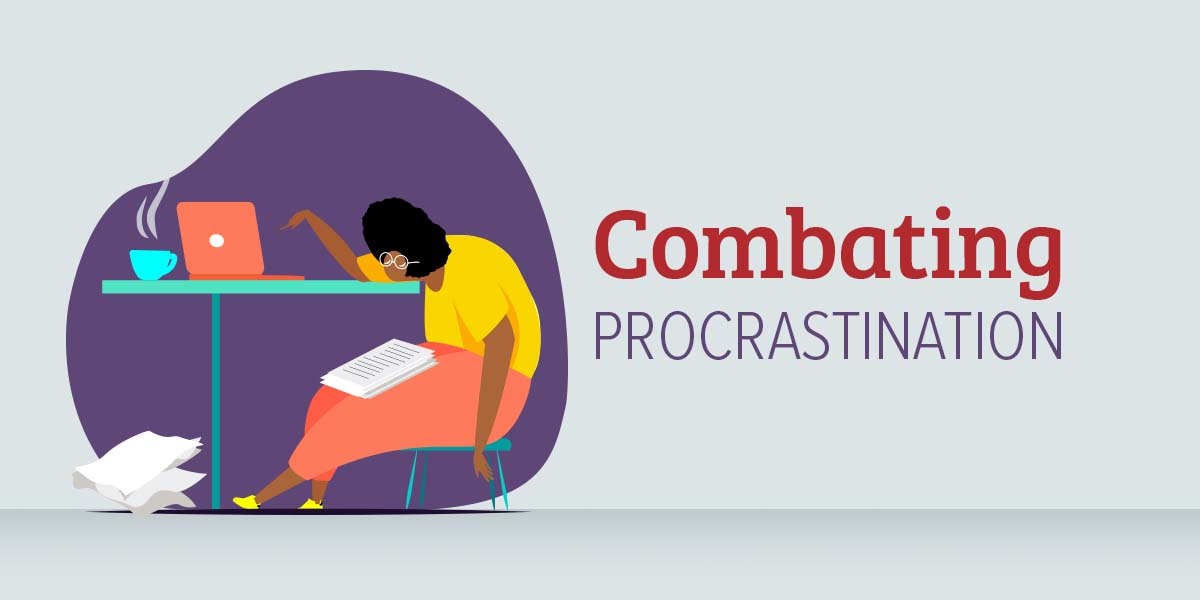Strategies and Tips (That Actually Work) to Combat Procrastination
Lisa Hirst Carnes | March 2023
 People procrastinate all the time. I’m procrastinating right now by writing this blog instead of working on my to-do list.
People procrastinate all the time. I’m procrastinating right now by writing this blog instead of working on my to-do list.
As the English poet Edward Young once said, “Procrastination is the thief of time.”This emphasizes the idea that when we procrastinate, we waste time in which we could be productive. By putting things off, we delay our progress and miss meaningful opportunities.
Why do we procrastinate even when it feels bad?
Reasons We Procrastinate
-
Lack of motivation or interest: When we don’t find a task interesting, we may put it off or avoid it altogether.
-
Fear of failure or perfectionism: Sometimes, we procrastinate because we fear failing. This fear can be paralyzing and prevent us from taking action.
-
Overwhelm or anxiety: When overwhelmed with work or anxious about a task, we may procrastinate to cope with these feelings.
-
Lack of planning or organization: When we don’t have a clear plan for approaching a task, it can be easy to put it off.
-
Distractions and temptations: With so many distractions around us, it can be hard to stay focused.
Recognizing why we procrastinate can help us develop strategies to overcome it.
Procrastination can be especially problematic in a team or collaborative environment. The issue is further increased by the fact that many organizations are remote-first.
Impacts of Procrastinating
- Delays in completing tasks: When one team member procrastinates, it can delay the entire team. This can result in missed deadlines and impact the team’s productivity.
- Increased stress and workload: If one team member procrastinates, it can put pressure on other team members who may need to step in.
- Communication breakdowns: If members aren’t proactive in communicating their progress, it can create misunderstandings. This can lead to delays and mistakes.
- Loss of trust and accountability: When team members fail to meet deadlines, trust and accountability can worsen. This can make it difficult for team members to rely on each other and work together.
- Negative impact on team morale: Procrastination can impact a team’s morale. This can lead to decreased job satisfaction and increased turnover.
Tips to Stop Procrastinating
- Just get started: There’s no time like the present. This is the best tip. If you get some momentum, it will be easier to keep going; if you keep going, you’ll see progress. You get the idea!
- The early bird gets the worm: Start early in the day when we usually have more willpower.
- Get clarity: Make sure you understand the project or task. If you feel like things are “fuzzy,” they are. Trust your gut and ask for more information.
- Save the easy stuff for later: When choosing between “write the development brief” or “do the laundry,” do the hard stuff first. The easy stuff can wait.
- Break tasks into smaller steps: Large tasks can be overwhelming. My partner, David, calls this “salamicizing” a task. Just as you cut a small piece of sausage, break tasks into smaller, manageable steps and focus on one at a time.
- Set specific and achievable goals: Set specific, achievable goals with deadlines. This will help you stay focused and motivated. SMART goals, anyone? Knowing when you’re done is challenging if you don’t have specific goals.
- Use a timer or schedule: Use a timer or schedule to help you manage your time and stay on track. This will also help you avoid distractions. At ArcStone, we use Harvest to track our time. If I’m using a timer, I’m more likely to stay focused.
- Eliminate distractions: Identify distractions that prevent you from completing tasks. This could mean turning off your phone, logging out of social media, and closing all those tabs! I’m telling myself this!
- Reward yourself: Give yourself a small reward for completing a task or reaching a goal. This will help you stay motivated and create positive associations with the task.
- Practice self-compassion: Don’t be too hard on yourself if you procrastinate. Instead, practice self-compassion and acknowledge that everyone struggles with procrastination.

